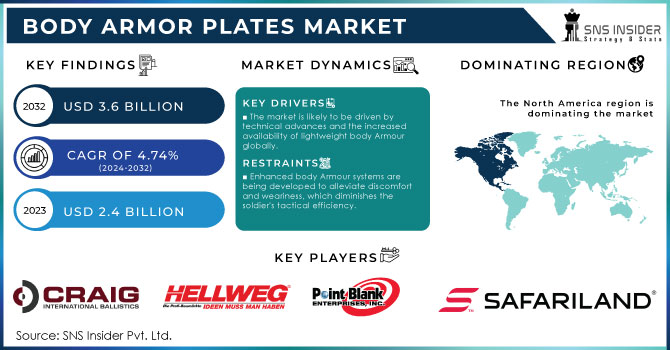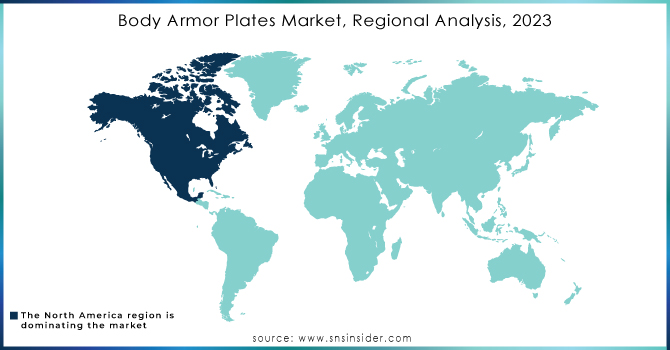Body Armor Plates Market Report Scope & Overview:

To get more information on Body Armor Plates Market - Request Free Sample Report
The Body Armor Plates Market Size was valued at USD 2.4 billion in 2023 and is expected to reach USD 3.6 billion by 2032 with a growing CAGR of 4.74% over the forecast period 2024-2032.
A Body Armor Plate is a protective Armour plate that is fitted into a carrier or bulletproof vest and can protect by itself or enhance the vest's protection. These are metal coverings that were previously worn to protect the human body during warfare. They are constructed of a combination of ceramics and bullet-resistant textiles and are generally used in bullet-resistant vests to provide additional protection from rifle and handgun shots. The ceramic hard plate Armour can survive rifle and armor-piercing fire. This improves safety measures and eliminates bullet harm to the human body in a battle scenario.
Countries all around the world have been involved in numerous territorial disputes, which has increased market demand for Body Armor Plates. Civilians have shown an increased demand for protection shields, which is another element driving expansion in this market. Terrorist activities and militant violence have increased globally, prompting the growth of defensive troops.
Ballistic protective suits have found their way into the official equipment of several military agencies that provide resistance to terrorism and militant activity. This particular advancement drives the Body Armor Plates Market need. Army modernization is an absolute necessity, and numerous governments all over the world are working on various modernization methods, including the inclusion of upgraded soldier gear.
MARKET DYNAMICS
KEY DRIVERS
-
The market is likely to be driven by technical advances and the increased availability of lightweight body Armour globally.
-
The increasing number of soldiers killed or injured as a result of terrorism and hostile operations around the world drives the demand for ballistic protective suits to defend military personnel.
RESTRAINTS
-
Enhanced body Armour systems are being developed to alleviate discomfort and weariness, which diminishes the soldier's tactical efficiency.
OPPORTUNITY
-
Global demand for soft shields or plates drives up investments in various R&D initiatives to improve the operating efficiency of these plates.
-
The rise in asymmetric warfare activities and cross-border tensions throughout the world has prompted numerous countries to embark on a military modernisation programme to improve soldier survivability.
CHALLENGES
-
Imparting numerous qualities to the material, such as low density, high tenacity, high tensile modulus, and low elongation at break, which is critical for soft body armour plates
-
The companies concentrate on developing protective suits made of various materials that meet NIJ standards in order to deliver effective soft body armour plates and retain market competitiveness.
Level IV body Armour plate led the market for body Armour plates in 2021with a revenue share of more than 25.0 percent. This segment is expected to grow at a significant rate throughout the forecast period. This increase is due to the fact that the final edition of NIJ (National Institute of Justice) Standard 0101.07 is expected to improve test techniques and performance standards for ballistic resistance levels. In addition, the new NIJ standard is expected to include additional threat levels for rifle protection. The increased vulnerability to rifle protection levels should contribute to the growth of the level IV Armour plate.
The market is divided into four applications: defence, law enforcement protection, civilians, and others. Body Armor Plates are most commonly used in the defence industry. Body Armor Plates are being used by defence forces to avoid casualties from terrorist operations and militant violence as global tensions rise. Law Enforcement Protection employees are exposed to a variety of hazards that might cause severe harm to a human body. Thus, body Armour plates aid in the prevention of harm and provide additional protection for law enforcement officers.
These authorities face danger during city protests, domestic violence, and other circumstances. In the event of a protocol violation, protection shields come in helpful to avert pandemonium during a civic demonstration. Body Armour plates are not just for military people. Civilians can also use the body Armour plates if they feel the need to. There is also a noticeable increase in civilian demand for protective shields, which contributes to the global Body Armor Plates Market's growth.
The market is classified into UHMWPE, Steel, Aramid, Composite Ceramic, and Others. UHMWPE is an Armour manufactured by attaching Ultra High Molecular Weight Polyethylene Fibers to a sheet of High-Density Polyethylene. These sheets are placed in Moulds and trimmed to shape. These sheets are then subjected to tremendous pressure and heat, which fuses them into a cohesive hard Armour plate. Steel body Armour plates are constructed of steel and protect the body from external threats such as bullets. Aramid plates are made up of heat-resistant fibres with a strong synthetic origin. They are employed in ballistic-rated body Armour.
Through their great hardness and compressive strength, composite ceramic plates are developed for armoured vehicles and personal armour to prevent projectile object penetration.
KEY MARKET SEGMENTATION
By Application
-
Defense
-
Law Enforcement Protection
-
Civilians
-
Others
By Material
-
Steel
-
Aramid
-
Composite Ceramic
By Level
-
Level IIA
-
Level II
-
Level IIIA
-
Level III
-
Level IV
REGIONAL ANALYSIS:
North America dominated the body armour plate market in 2019, accounting for 30.0 percent of total revenue. Government military programmes, such as the Extremity Protection programme and the Soldier Protection System-Torso for delivering full body armour to the armed services, are expected to drive regional market expansion. Furthermore, the area contains key countries that dominate the global military spending industry.
The market for body armour plates in Asia Pacific is predicted to grow at the fastest rate of 6.7 percent during the forecast period. Large-scale upgrading of conventional systems, as well as an increase in wars and border disputes in Asia Pacific area growing countries such as China, India, and South Korea, fuel demand for protection equipment plates in this region. Furthermore, the requirement to provide personal protection to ground forces in the region, as well as consistent government spending in procuring competitive weaponry and personal protection equipment, is likely to stimulate regional market growth prospects.

Need any customization research on Body Armor Plates Market - Enquiry Now
REGIONAL COVERAGE:
-
North America
-
USA
-
Canada
-
Mexico
-
-
Europe
-
Germany
-
UK
-
France
-
Italy
-
Spain
-
The Netherlands
-
Rest of Europe
-
-
Asia-Pacific
-
Japan
-
south Korea
-
China
-
India
-
Australia
-
Rest of Asia-Pacific
-
-
The Middle East & Africa
-
Israel
-
UAE
-
South Africa
-
Rest of Middle East & Africa
-
-
Latin America
-
Brazil
-
Argentina
-
Rest of Latin America
-
KEY PLAYERS
The Major Players are Aegis Engineering Ltd, Craig International Ballistics Pty Ltd, Hellweg International, Kejo Limited Company, Pacific Safety Products, Point Blank Enterprises, Inc, Safariland, LLC, Armored Republic, LLC, BAE Systems, Ballistic Body Armour Pty., and other players
| Report Attributes | Details |
|---|---|
| Market Size in 2023 | US$ 2.4 Billion |
| Market Size by 2032 | US$ 3.6 Billion |
| CAGR | CAGR of 4.74% From 2024 to 2032 |
| Base Year | 2023 |
| Forecast Period | 2024-2032 |
| Historical Data | 2020-2022 |
| Report Scope & Coverage | Market Size, Segments Analysis, Competitive Landscape, Regional Analysis, DROC & SWOT Analysis, Forecast Outlook |
| Key Segments | • By Application (Defense, Law Enforcement Protection, Civilians, Others) • By Material (Steel, Aramid, Composite Ceramic) • By Level( Level IIA, Level II, Level IIIA, Level III, Level IV) |
| Regional Analysis/Coverage | North America (USA, Canada, Mexico), Europe (Germany, UK, France, Italy, Spain, Netherlands, Rest of Europe), Asia-Pacific (Japan, South Korea, China, India, Australia, Rest of Asia-Pacific), The Middle East & Africa (Israel, UAE, South Africa, Rest of Middle East & Africa), Latin America (Brazil, Argentina, Rest of Latin America) |
| Company Profiles | Aegis Engineering Ltd, Craig International Ballistics Pty Ltd, Hellweg International, Kejo Limited Company, Pacific Safety Products, Point Blank Enterprises, Inc, Safariland, LLC, Armored Republic, LLC, BAE Systems, Ballistic Body Armour Pty., and other players. |
| DRIVERS | • The market is likely to be driven by technical advances and the increased availability of lightweight body Armour globally. • The increasing number of soldiers killed or injured as a result of terrorism and hostile operations around the world drives the demand for ballistic protective suits to defend military personnel. |
| RESTRAINTS | • Enhanced body Armour systems are being developed to alleviate discomfort and weariness, which diminishes the soldier's tactical efficiency. |

